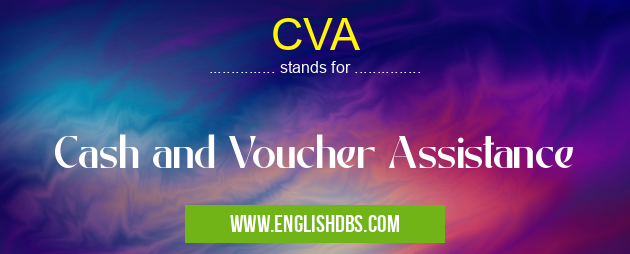What does CVA mean in UNITED NATIONS
CVA stands for Cash and Voucher Assistance. It is a type of humanitarian assistance provided by governments or aid organizations to vulnerable populations in emergency situations. CVA aims to meet the immediate needs of individuals and families affected by crises, such as natural disasters, conflicts, or economic shocks.

CVA meaning in United Nations in Governmental
CVA mostly used in an acronym United Nations in Category Governmental that means Cash and Voucher Assistance
Shorthand: CVA,
Full Form: Cash and Voucher Assistance
For more information of "Cash and Voucher Assistance", see the section below.
CVA Meaning in Governmental
In the context of governance, CVA falls under the broader category of social assistance programs. It is typically implemented by government agencies or non-governmental organizations (NGOs) in collaboration with local authorities and community groups. CVA programs may vary in design and scope depending on the specific needs and resources available.
CVA Full Form
- Cash: Direct financial assistance provided to eligible individuals or households.
- Vouchers: Coupons or electronic cards that can be redeemed for essential goods or services, such as food, hygiene items, or fuel.
What Does CVA Stand For?
CVA stands for Cash and Voucher Assistance, which is a form of humanitarian assistance that provides direct cash or vouchers to vulnerable populations in emergency situations.
Essential Questions and Answers on Cash and Voucher Assistance in "GOVERNMENTAL»UN"
What is Cash and Voucher Assistance (CVA)?
Cash and Voucher Assistance (CVA) is a form of humanitarian aid that provides cash or vouchers to individuals or households affected by crises or emergencies. This assistance allows beneficiaries to purchase essential goods and services, such as food, water, shelter, and hygiene items, from local markets.
What are the benefits of providing CVA?
CVA provides several benefits, including:
- Flexibility: Beneficiaries can use the cash or vouchers to purchase the specific items they need, giving them control over their spending.
- Reduced dependency: CVA helps reduce dependency on aid organizations by empowering beneficiaries to make their own decisions and support local economies.
- Enhanced dignity: By providing cash or vouchers, CVA preserves the dignity of beneficiaries by allowing them to choose what they need.
Who is eligible for CVA?
Eligibility criteria for CVA vary depending on the specific program and context. However, common eligibility factors include:
- Individuals or households affected by emergencies, such as natural disasters, conflicts, or displacement.
- Vulnerable populations, such as women, children, the elderly, or those with disabilities.
- Individuals or households who lack access to basic necessities, such as food, water, or shelter.
How is CVA distributed?
CVA can be distributed through various methods, including:
- Cash transfers: Electronic or physical cash is directly transferred to beneficiaries.
- Voucher distribution: Beneficiaries receive vouchers that can be redeemed for specific goods or services at designated shops or markets.
- Conditional transfers: Cash or vouchers are provided to beneficiaries who meet certain conditions, such as attending school or receiving vaccinations.
Final Words: CVA is an essential tool in disaster response and humanitarian aid efforts. It empowers individuals and families to meet their basic needs and regain some control over their lives. By providing direct financial assistance or vouchers, CVA helps to mitigate the economic consequences of crises and support vulnerable populations in rebuilding their livelihoods.
CVA also stands for: |
|
| All stands for CVA |
